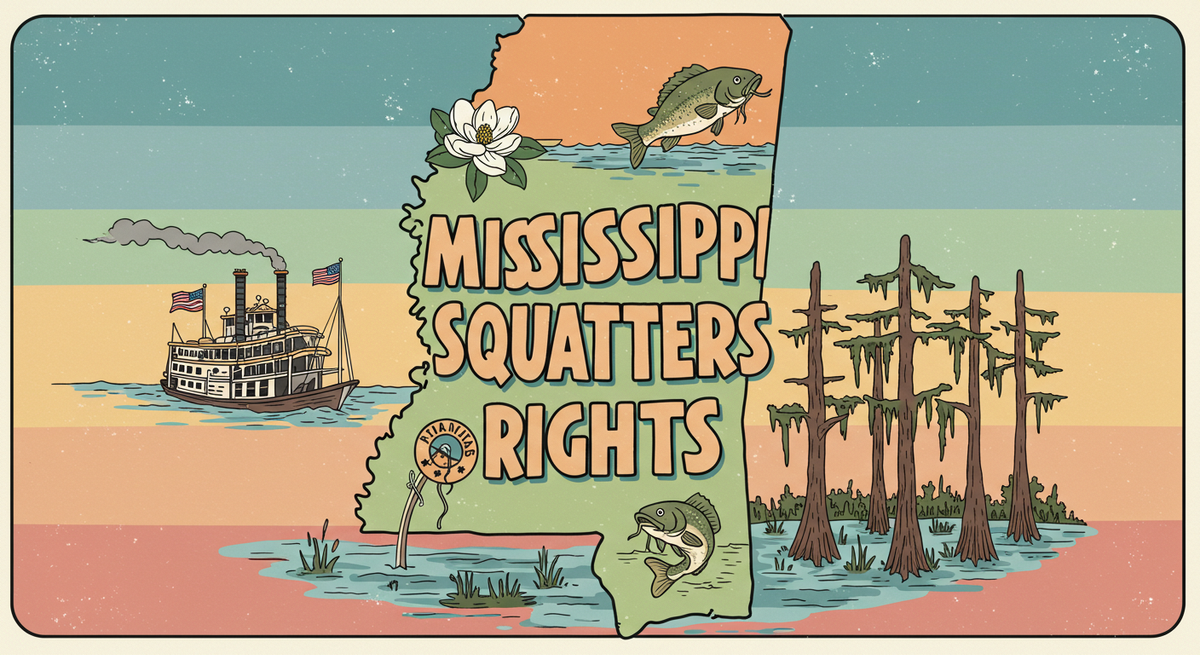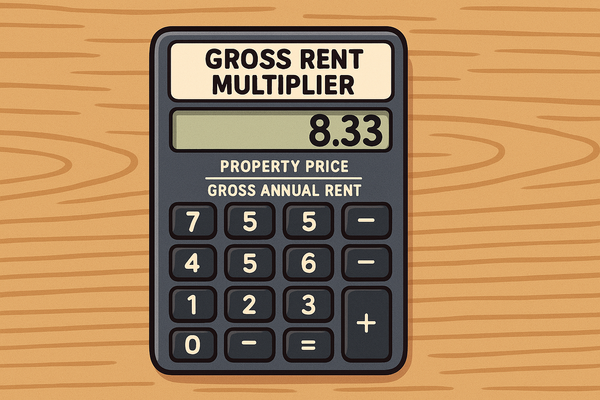Mississippi Squatters Rights Guide: Understanding Adverse Possession Laws (2025)
In Mississippi, someone occupying your property for 10 years could potentially gain ownership through "adverse possession" - commonly known as squatters rights.

Introduction to Squatters' Rights in Mississippi
Imagine returning to your Mississippi vacation home only to discover strangers living there, claiming they now have legal rights to stay. Shocking but true: in Mississippi, someone occupying your property for 10 years could potentially gain ownership through "adverse possession" - commonly known as squatters rights.
This comprehensive guide breaks down Mississippi's unique property laws, prevention strategies, and recent legislative changes aimed at protecting property owners. We'll explore the surprising 30-day rule that gives unauthorized occupants certain legal protections after just one month, examine the shocking case of Marcia Naylor (a grandmother declared a "squatter" in her own home), and provide actionable steps to safeguard your property against unwanted claims.
Whether you own rural land, investment property, or a family vacation home in the Magnolia State, understanding these squatters rights laws isn't just helpful—it's essential protection against potentially losing your property rights altogether.
Squatters vs. Trespassers: Know the Crucial Difference
Mississippi property owners face a unique challenge when it comes to protecting their real estate from unauthorized occupants. Understanding the difference between squatters and trespassers is crucial: trespassing is a criminal offense that involves entering property without permission. Squatting typically involves a person living on a property for an extended period without authorization. While trespassers can be removed immediately by police, squatters who have established residency often receive certain legal protections under Mississippi state law.
The Legal Concept of Adverse Possession Explained
Adverse possession – commonly known as "squatters rights" – is a legal doctrine that allows someone who doesn't legally own a property to eventually gain ownership rights if they occupy it openly, continuously, and without the owner's permission for a specific period. In Mississippi, this required period is 10 years. This concept dates back to early American property law, which favored productive use of land over absentee ownership. The historical purpose was to prevent valuable property from sitting abandoned and to reward those who maintained and improved otherwise neglected land.
Why Mississippi Property Owners Must Take Notice
For Mississippi property owners, especially those with vacation homes, inherited properties, or investment real estate, understanding these state laws isn't just academic – it's essential protection against potentially losing their property rights.
The Mississippi Supreme Court regularly hears cases related to adverse possession claims, highlighting the ongoing relevance of these laws in modern property disputes. With recent high-profile cases like Marcia Naylor's shocking experience, property owners across the state are realizing the importance of proactive protection measures.
Squatter Snippet: The Shocking Case of Marcia Naylor
A Homeowner's Worst Nightmare Comes True
In a bewildering turn of events that highlights the vulnerabilities within Mississippi's property law system, Olive Branch resident Marcia Naylor found herself living what can only be described as a property owner's worst nightmare.
After being duped by a sophisticated "quitclaim deed" scam, this Mississippi grandmother was not only forced out of her own home but astonishingly declared a "squatter" on the very property she rightfully owned.
How a Financial Hardship Led to Catastrophe
Following her husband's death, Naylor struggled with mounting financial obligations while caring for her two grandchildren. A company representative offered what appeared to be a legitimate financial arrangement, similar to a home equity loan.
After sharing her deed of trust, Naylor later discovered the company had filed a quitclaim deed transferring her property. When she went to court expecting justice, the judge instead upheld the fraudulent document, declaring her a squatter in her own home and ordering her immediate eviction.
Exposing Dangerous Gaps in Property Protection
This extraordinary case reveals dangerous gaps in property protection laws and demonstrates how easily legitimate homeowners can fall victim to predatory schemes in the absence of robust legal safeguards.
Key Timeline: Statutory Period in Mississippi
The 10-Year Rule: Mississippi's Baseline Requirement
Mississippi law requires squatters to maintain continuous possession for 10 years before they can claim property rights through adverse possession. This decade-long period must be uninterrupted, with the squatter maintaining consistent occupation of the property.
Understanding Continuous Possession Requirements
For adverse possession to be valid, occupation must occur without significant gaps. Temporary absences for normal reasons (like vacation) don't typically break continuity, but extended abandonment would reset the clock.
How Mississippi Compares to Neighboring States
Mississippi's 10-year requirement aligns with some neighboring states but differs from others:
- Alabama: 10 years
- Arkansas: 7 years (with color of title), 15 years (without)
- Tennessee: 7 years (with color of title), 20 years (without)
Important Exceptions to the Timeline
Several circumstances can pause or extend the statutory period:
- Military service
- Incarceration
- Legal incompetence/disability
- Mississippi "16th Section Lands" designated for education require 25 years
CHART: Adverse Possession Timeline Comparison
| State | Required Years | Special Conditions |
|---|---|---|
| Mississippi | 10 years | Must pay property taxes for at least 2 years |
| Alabama | 10 years | No tax payment requirement |
| Arkansas | 7/15 years | 7 years with color of title; 15 without |
| Tennessee | 7/20 years | 7 years with color of title; 20 without |
Quick Guide for Property Owners
Recent Changes Strengthen Owner Protections
In 2022, Mississippi amended its adverse possession laws to require 90-day notification to the chancery clerk before claims mature, providing property owners a better chance to defend their rights. This change came in response to growing concerns about adverse possession claims, particularly in rural areas where property monitoring can be challenging.
Mississippi's Surprising 30-Day Rule
Did you know? Mississippi's "30-day rule" provides certain procedural protections to individuals who have occupied a property for just one month—a surprisingly short timeframe compared to the decade required for adverse possession. After just 30 days, unauthorized occupants gain rights that require formal eviction procedures rather than immediate removal.
The Balancing Act of Mississippi Law
Mississippi's combination of a moderate 10-year possession period with the additional requirement to pay property taxes for at least two years creates a somewhat balanced system, though the Marcia Naylor case demonstrates that vulnerabilities still exist.
Essential Protection Strategies for Property Owners
- Know your timeline: Squatters can claim rights after 10 years of continuous occupation
- Documentation matters: Keep property records, tax receipts, and inspection logs
- Regular monitoring required: Vacant properties are most vulnerable
- Legal obligation: Self-help eviction methods are illegal in Mississippi
- Act quickly: The longer squatters remain, the stronger their potential claim
- Proper notices: Follow legal procedures when removing unauthorized occupants
Prevention: Protecting Your Property
Mississippi's Rural Character Creates Unique Challenges
Mississippi's predominantly rural character creates unique challenges for property owners. With approximately 53% of the state's land classified as rural, many properties have limited visibility from public roads and neighboring structures, increasing vulnerability to undetected squatting. The state's humid subtropical climate accelerates vegetation growth that can quickly obscure evidence of property boundaries and maintenance, potentially strengthening adverse possession claims by making neglect more apparent.
What Mississippi Courts Look For in Property Disputes
Courts in Mississippi view consistent monitoring as evidence of the owner's continued interest in maintaining possession and control. Property owners who can demonstrate regular visits, maintenance activities, and security measures significantly strengthen their position against adverse possession claims. Physical security and clear signage are particularly important in Mississippi, as courts consider the visibility of ownership claims when evaluating whether possession was truly "open and notorious."
- Regular inspections:
- Visit property at least quarterly
- Document each visit with photos/notes
- Effective security measures:
- Secure all entry points
- Consider alarm systems
- Install motion-activated lighting
- Clear signage:
- Post "No Trespassing" signs visibly
- Mark property boundaries clearly
- Property management options:
- Hire professional management for vacant properties
- Consider rental options for long-term vacancies
- Documentation practices:
- Keep tax payment records
- Maintain utility connections
- Take dated photographs regularly
CHART: Property Risk Assessment Matrix
| Property Type | Risk Level | Recommended Prevention | Estimated Cost |
|---|---|---|---|
| Vacant Land | High | Fencing, signage, quarterly inspections | $$$-$$$$ |
| Abandoned Building | High | Security system, reinforced entry points, monthly checks | $$-$$$ |
| Seasonal Property | Medium | Property management service, security system | $$-$$$ |
| Investment Property | Low-Medium | Tenant occupancy, professional management | $-$$ |
Removing Squatters: Step-by-Step Process
The Critical Distinction: Trespassers vs. Squatters
Mississippi distinguishes between trespassers (who can be removed immediately) and squatters (who have established some form of occupancy and require formal eviction). Under Mississippi Code § 15-1-13 and § 15-1-15, property owners must follow specific legal procedures to reclaim their property from squatters. After 30 days of occupation, Mississippi law requires property owners to provide written notice allowing squatters 30 days to leave voluntarily before filing an eviction lawsuit.
New Legislation May Streamline the Process
The Mississippi House recently passed House Bill 1200, known as the "Real Property Owners Protection Act," which aims to establish clearer mechanisms for removing squatters by outlining a specific process through which law enforcement can assist property owners. If passed, this legislation would create a streamlined procedure allowing owners to file notice with local law enforcement, who would then notify alleged squatters within 24 hours, giving them three days to legally challenge the eviction.
- Document the situation:
- Take photos/video of occupation
- Gather ownership documents
- Issue proper written notice to vacate
- File appropriate legal complaint:
- Wrongful detainer action in Mississippi
- Include all required documentation
- Attend court hearing
- If successful, obtain order of restitution/eviction
- Sheriff enforces removal, not property owner
- What NOT to do:
- Do not change locks yourself
- Do not shut off utilities
- Do not remove squatter's belongings
- Do not threaten or intimidate
- Do not use physical force
- Timeline expectations:
- Notice period: 30 days
- Court processing: 2-8 weeks
- Eviction enforcement: 1-7 days after judgment
CHART: Eviction Process Timeline
Mississippi's eviction process for squatters generally follows the same framework as tenant evictions but with some important distinctions. The process typically takes between two to eight weeks to complete, depending on court calendars and whether the squatter contests the eviction. After filing the eviction lawsuit, the court will issue a summons to be served on the squatter along with a copy of the complaint. The summons must be served within 120 days after filing the complaint, typically by the sheriff or a process server for a fee of $45.
[Discovery of Squatter] → [Documentation: 1-2 days] → [Notice to Vacate: 30 days] →
[Court Filing: 1 day] → [Waiting for Hearing: 2-8 weeks] → [Court Hearing: 1 day] →
[If successful, Wait for Order: 1-7 days] → [Sheriff Enforcement: 1-7 days] → [Property Returned]
Total estimated timeline: 5-12 weeks
Legal Requirements for Adverse Possession
The OCEAN Criteria: Mississippi's Five-Part Test
Mississippi courts evaluate adverse possession claims using the "OCEAN" criteria, which establishes specific elements that must be present throughout the entire statutory period. Each element serves a distinct purpose in the legal analysis, creating a structured framework for determining the validity of adverse possession claims.
The Higher Burden of Proof in Adverse Possession Cases
The Mississippi Supreme Court has consistently upheld that all elements must be proven by "clear and convincing evidence," a standard higher than the typical civil case requirement of "preponderance of evidence." This elevated standard reflects the significance of potentially transferring property rights without compensation.
- Open Possession
- Must be visible and apparent to anyone observing the property
- Cannot be secretive or hidden from public view
- Examples: Building structures, farming land, regular maintenance
- Continuous Possession
- Occupation for full 10 years without significant interruption
- Seasonal use may qualify if consistent with how the legal owner would use the property
- Temporary absences allowed if property not abandoned
- Exclusive Possession
- Possession to the exclusion of all others, including the legal owner
- Joint use with others typically defeats this requirement
- Must act as the true owner would by controlling access
- Adverse/Hostile Claim
- Possession without the legal owner's permission
- Mississippi follows the rule that permitted use is not "adverse"
- Even good faith (mistaken belief of ownership) can satisfy this element
- Notorious Possession
- Community awareness of the occupation
- Neighbors would recognize the squatter as appearing to be the owner
- Reinforces the notice function of adverse possession
CHART: Adverse Possession Requirements Matrix
| Requirement | Required in Mississippi? | Evidence Courts Accept | Common Pitfalls |
|---|---|---|---|
| Open Possession | Yes | Visible improvements, structures, regular maintenance | Hidden structures, minimal changes to property |
| Continuous Possession | Yes | 10 years of documented presence, utility bills, mail delivery | Extended absences, seasonal use without consistent pattern |
| Exclusive Possession | Yes | Fencing, locks, controlling access, sole decision-making | Shared use with others, owner access not prevented |
| Adverse/Hostile | Yes | No lease, no permission documentation, evidence of claim | Having owner's permission (verbal or written) |
| Notorious | Yes | Neighbor testimonies, community recognition as "owner" | Secretive occupation, minimal community interaction |
Frequently Asked Questions: Mississippi Squatters Rights
- "Can I remove squatters myself?"
- No, self-help eviction is illegal in Mississippi
- Must follow legal eviction process
- "Do squatters have to pay property taxes?"
- In Mississippi, squatters must pay property taxes for at least 2 years during the 10-year period to establish adverse possession
- "What's the difference between a squatter and a trespasser?"
- Trespassers: Short-term unauthorized presence
- Squatters: Ongoing occupation with potential adverse possession claim
- "Who should I contact first - police or sheriff?"
- For immediate safety concerns: Police
- For eviction enforcement: Sheriff
- "Can squatters claim abandoned property?"
- Yes, if all adverse possession requirements are met
- Abandonment may actually strengthen their claim
- "How quickly can I evict a squatter?"
- Typical timeline: 5-12 weeks
- Factors affecting timeline: court schedule, appeals, evidence quality
CHART: Decision Tree for Property Owners
Mississippi law enforcement typically views recent unauthorized entries (less than 24 hours) as criminal trespassing, allowing for immediate police intervention. However, after this initial period, the situation often becomes a civil matter requiring formal eviction procedures. The distinction between criminal trespass and civil squatting can be frustrating for property owners but reflects Mississippi's balance between property rights and occupancy protections. Law enforcement agencies in Mississippi generally advise property owners to document evidence of breaking and entering if they want police to treat the matter as criminal trespassing rather than a civil dispute.
Discovered Someone on Your Property
├── Emergency/Dangerous Situation? → Yes → Call Police
│ └── No ↓
├── Recent Entry (Less than 24 hours)? → Yes → Call Police (Trespasser)
│ └── No ↓
├── Evidence of Established Occupation? → Yes → Legal Eviction Process Required
│ └── No ↓
└── Uncertain Situation → Consult Attorney Before Taking Action
Recent Legislative Changes in Mississippi
The 90-Day Notification Requirement: A Win for Property Owners
Mississippi's property laws have seen significant activity in recent years as the legislature works to address concerns from property owners. In 2022, House Bill 12 successfully amended Section 15-1-13 of the Mississippi Code to require individuals claiming title by adverse possession to notify the chancery clerk 90 days before their claim will mature. This amendment ensures that property owners of record receive certified notification of imminent adverse possession claims, providing an opportunity to contest these claims before they ripen into ownership rights.
The "Real Property Owners Protection Act": What's Coming Next
More recently, House Bill 1200 (2025), known as the "Real Property Owners Protection Act," has advanced through the House and into Senate committee consideration. This bill aims to establish clearer mechanisms for removing squatters by outlining a specific process through which law enforcement can assist property owners in reclaiming their properties from unauthorized occupants. The legislation would create a streamlined procedure allowing owners to file notice with local law enforcement, who would then notify alleged squatters within 24 hours, giving them three days to legally challenge the eviction.
- Recently Passed Laws:
- House Bill 12: Passed 2022, this law requires 90-day notification to chancery clerk before adverse possession claims mature
- Impact on property owners: Provides certified notification of imminent claims
- Effective date: July 1, 2022
- Pending Legislation:
- House Bill 1200 "Real Property Owners Protection Act": Currently in Senate committee
- Proposed changes: Streamlined process for removing squatters with law enforcement assistance
- Expected implementation: Potentially July 2025 if passed
- Legislative Trends:
- Mississippi laws trending toward stronger property owner protections
- Failed attempts to completely prohibit adverse possession (House Bill 298, 2025)
- Focus on balancing traditional property rights with protecting against fraud
State-Specific Considerations: Mississippi's Unique Approach
- Color of Title in Mississippi:
- Definition: Document that appears to give ownership but is legally deficient
- Impact on statutory period: Not strictly required but strengthens claim
- Can be obtained through property tax sales after owner fails to pay for 2+ years
- Burden of proof requirements:
- Squatter must prove all elements of adverse possession by "clear and convincing evidence"
- Higher standard than typical civil "preponderance of evidence"
- Recent legal developments:
- Marcia Naylor case highlighting vulnerability to quitclaim deed fraud
- Pending "Stop Squatters Act" (failed to advance in 2025)
- Increased focus on property owner education and protection
- How Mississippi differs from neighboring states:
- Tax payment requirement (minimum 2 years)
- Special 25-year requirement for "16th Section Lands" (education lands)
- 90-day notification requirement before claims mature
- 30-day rule giving procedural protections after minimal occupation
CHART: Mississippi vs. Neighboring States Comparison
| Factor | Mississippi | Alabama | Arkansas | Tennessee |
|---|---|---|---|---|
| Statutory Period | 10 years | 10 years | 7/15 years | 7/20 years |
| Color of Title Impact | Not required | Not required | Reduces to 7 years | Reduces to 7 years |
| Tax Payment Required | Yes (2+ years) | No | No | No |
| Special Conditions | 25 years for education lands | N/A | N/A | N/A |
| Strictness Rating | 3.5/5 | 3/5 | 3.5/5 | 4/5 |
Advanced Legal Process: Navigating Mississippi Courts
Court Jurisdiction and Filing Requirements
Court proceedings in Mississippi typically involve filing in the county where the property is located. The proper venue is critical for jurisdiction and can affect how quickly your case moves through the system.
Building Your Legal Case: Essential Evidence
Evidence requirements include tax receipts, witness testimonies, photographs of improvements, maintenance records, and documentation of ownership. The strength of your evidence often determines the outcome of adverse possession disputes.
Potential Outcomes in Adverse Possession Cases
Potential outcomes range from complete dismissal of the adverse possession claim to full property transfer. Courts may also award:
- Monetary judgments for property damage
- Compensation for lost rent or use
- Clear title confirmation for the rightful owner
- Legal costs in some circumstances
Special Provisions and Protections
Special provisions exist for legally incompetent individuals, extending timeframes and providing additional protections. Mississippi law recognizes that certain vulnerable populations may need extra time to assert their property rights.
Real-World Examples: Mississippi Adverse Possession Cases
The Quitclaim Nightmare: Marcia Naylor's Cautionary Tale
Marcia Naylor's case stands as the most shocking example of property rights gone wrong in recent Mississippi history. This grandmother was declared a "squatter" in her own home after falling victim to a sophisticated quitclaim deed scam following her husband's death. Despite her insistence that she never signed transfer documents, the court upheld the fraudulent deed, highlighting dangerous vulnerabilities in the state's property law system.
The Absent Owner's Surprise: DeSoto County Cases
Multiple cases in rural DeSoto County have involved absentee landowners who discovered squatters had been living on their properties for several years. In one notable instance, a property owner who moved to Texas returned after five years to find a family had built a small cabin on his hunting land and was claiming adverse possession rights. The court ruled in the owner's favor since the 10-year requirement hadn't been met.
Successful Adverse Possession: The Farm That Changed Hands
A successful adverse possession claim occurred when a family began farming abandoned land in central Mississippi for over 15 years. They built structures, maintained fences, paid property taxes, and were widely recognized by neighbors as the property's owners. When the record owner finally attempted to reclaim the land, the court awarded ownership to the farming family based on their meeting all OCEAN criteria for the required timeframe.
When Adverse Possession Claims Fail: The Shared Property Case
An unsuccessful claim involved a situation where the occupation was sporadic and not exclusive. The alleged adverse possessor had used the land for gardening but had allowed others, including the actual owner, to also use portions of the property. The court ruled that this shared use defeated the "exclusive possession" requirement and denied the adverse possession claim.
Resources for Mississippi Property Owners
Stay Current With Mississippi Squatters Rights Laws
- Mississippi Code § 15-1-13
- Official legal text at Justia.com
- Last updated: July 2022
- Contains core adverse possession requirements and the recent 90-day notification provision
Track Recent and Pending Legislation
- House Bill 1200 (2025) "Real Property Owners Protection Act"
- Track at Mississippi Legislature website
- Bill status: In Senate committee consideration
- Would create streamlined process for removing squatters with law enforcement assistance
Where to Find Legal Assistance
- Mississippi Bar Association
- msbar.org
- Lawyer referral service
- Educational resources about property rights
- Mississippi Legal Services
- mslegalservices.org
- Resources for low-income property owners
- Self-help guides for property disputes
Legal Disclaimer
DISCLAIMER: The information provided in this guide is for general informational purposes only and should not be construed as legal advice on any subject matter. The content contained herein does not establish an attorney-client relationship.
This guide about Mississippi squatters' rights and adverse possession laws is intended to provide general information and should not be relied upon as legal advice. Laws and regulations regarding property rights, adverse possession, and eviction procedures vary by jurisdiction and may change over time. The information presented here may not reflect the most current legal developments or address your specific situation.
No reader should act or refrain from acting based on information in this guide without first seeking professional legal advice. Property owners dealing with squatters should consult with a qualified attorney licensed to practice in their jurisdiction for advice tailored to their particular circumstances.
The authors, publishers, and distributors of this guide expressly disclaim all liability in respect to actions taken or not taken based on any or all of the contents of this document. They shall not be responsible for any errors or omissions in this information or any consequences arising from its use.
This guide is provided "as is" without warranty of any kind, either express or implied, including but not limited to implied warranties of merchantability, fitness for a particular purpose, or non-infringement.
Copyright © 2025. All rights reserved.





